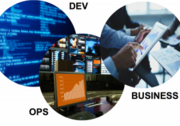Upgrade & Secure Your Future with DevOps, SRE, DevSecOps, MLOps!
We spend hours on Instagram and YouTube and waste money on coffee and fast food, but won’t spend 30 minutes a day learning skills to boost our careers.
Master in DevOps, SRE, DevSecOps & MLOps!
Learn from Guru Rajesh Kumar and double your salary in just one year.
Source:- techtarget.com
The first time I heard the word “BizDevOps,” I had one question: How is this development different from earlier efforts to engage business executives in delivering great software?
I was skeptical, but not dismissive. Yes, BizDevOps is a buzzword, but it felt like more than that. I was excited. After all, this buzzword had “biz” in the name. The very emergence of the term was a victory of sorts. This thing we call BizDevOps acknowledges something my colleagues and I have been writing about for a long time: No company can deliver great software without engaging top business executives in the process.
No one developing software today disputes that. And yet, sustaining the engagement of business executives continues to be frustrating for software pros. Countless articles on this site and others chronicle those frustrations. Top managers tout the strategic importance of software to the bottom line, but they remain reluctant to devote full-time product owners to development projects. Another, not atypical example: A mature Agile team, deep into a development project, reached an impasse, where the CEO held one vision and the software pros an altogether different one. Weren’t these problems we solved years ago?
And then there are the software delivery challenges. Companies that made deep commitments to DevOps admit that the cultural differences between development and operations prevent them from delivering better software faster and more frequently. Will the emergence of BizDevOps change all this? Will business, development and operations come together to deliver great software? Has the right time finally arrived?
I posed those questions to Flint Brenton, CEO of South San Francisco-based CollabNet, which sells software development tools and services, and operating partner at the private equity firm Vector Capital. “What is the biggest hurdle to making BizDevOps happen?” I asked him. “It’s hard to change human behavior,” he said.
Here are some highlights of my recent conversation with Brenton.
Agile paved way for BizDevOps
The widespread use of Agile techniques is driving the move to BizDevOps. In spite of recent criticism, “Agile remains the pre-eminent means of new development and has created a need for speed,” Brenton said. Put another way, business executives share the expectation that software must be developed and delivered faster and more efficiently than it is now, and that sets the stage for BizDevOps adoption.
BizDevOps: Why now?
But the biggest reason why BizDevOps is happening now is that technology is capable of driving business outcomes in ways that weren’t possible in the past, Brenton said. “The primary way to deliver that value is through software.” That idea has been around for awhile and, more recently, the concept has taken hold. “The whole marketplace has evolved to the point where most enterprises are now software companies,” he said, referring to businesses that don’t sell software, per se.
Brenton’s definition of BizDevOps illustrates his point: “BizDevOps is the ability to take an idea conceived by the business, create value from that idea in software and deploy it so customers quickly realize the value of what was conceived.”
BizDevOps: The people piece
Getting management and employees to embrace the concept of BizDevOps is one thing. But how you get them to change their behavior to support the effort is the million-dollar question, Brenton said. “How do I get my company to change, when we have been doing it one way for many years?”
One widely understood way to change the culture is to change the people, he said. “The culture has to evolve to support the digitization [that BizDevOps depends on],” he said. Obviously, you can’t change everybody, so hire people who embrace digitization. “They’re young, they’re just out of college.”
He’s not suggesting all hires must be young to embrace new ways of working. “What we’re experiencing now is a once-in-a-generation change,” he said. “You can learn it, internalize it and reinvent yourself. It’s a decision we can all make.”
